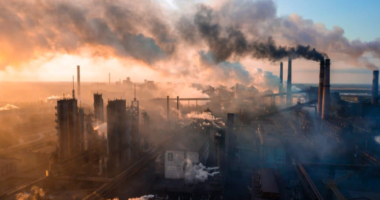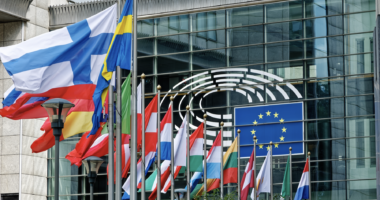Climate, Health and Equity Brief
SoCal devastation, 2024 wins and a look ahead to 2025
January 11, 2025

The Climate, Health & Equity Brief is GMMB’s take on the latest news on the current impacts of climate change. If you haven’t subscribed yet, you can do so by clicking here.
Hot Topic: Tipping point. Firestorm devastation continues today in one of the most destructive wildfires in California history. At least 11 people have died, 10,000 homes and businesses have been destroyed, and entire communities have been reduced to rubble in wildfires with an estimated cost—so far—of $50 billion. The Palisades Fire alone has surpassed the size of Manhattan and is only 11% contained as of this writing.
It is against this backdrop that we consider the positives and negatives of climate in 2024 and the opportunities and challenges that lie ahead this year. It is perhaps no surprise that 2024 was the hottest year on record, as scientists say such dubious honors are likely to continue for every year to come. What is remarkable is that the planet surpassed the 1.5°C (2.7°F) Paris Agreement threshold for the first time, resulting in a global average of 41 extra days of dangerous heat last year, with some countries, like Indonesia—which contributes little in the way of emissions—enduring 122 additional days of extreme heat in 2024. Temperature increases also show no signs of slowing, meaning the impacts scientists have warned about, and that are bearing out globally, will likely become a consistent fact of life.
But there was good news in 2024. Despite record-high coal use, solar energy capacity expanded significantly, driven by affordable panel prices. China, India, and Germany showed steady solar growth, and even countries like Saudi Arabia and Pakistan increased their solar demand. And the U.K. became the first G7 country to eliminate coal from its energy mix by closing its last coal-fired plant in September. These moves continue to hasten the demise of coal, even if peak global coal use has yet to be reached.
The proliferation of electric vehicles and related infrastructure also gained momentum. Thanks to Biden Administration investments, U.S. fast-charging stations surged by 35% in the first nine months of 2024, with much of the new infrastructure built in rural areas. Australia improved accessibility by offering low-interest EV loans to people making less than $100K annually. And in Norway, 90% of cars sold in 2024 were EVs, bringing the country very close to its goal of eliminating fossil-fuel-powered car sales in 2025.
The need for continued climate action this year could not be more clear. While emissions continue to rise, fossil fuel demand remains high, and U.S. action is sure to take a major hit under new leadership, economic trends and technological advancements suggest that a sustainable transition is not only possible but inevitable. The challenge now lies in accelerating these efforts to meet the scale of the crisis.
Human Health
Scientists say the historic, deadly and wildly destructive firestorms in Southern California have fed off unusually fierce Santa Ana winds, climate-fueled drought and higher temperatures, shedding yet another spotlight on the devastating impact of human-induced emissions. (Axios, The Guardian)
A new report from Global Water Monitor has found that water disasters fueled by rising temperatures that disrupt the water cycle killed over 8,000 people, forced 40 million from their homes, and caused over $550 billion in economic damage in 2024. (The Guardian)
Amid a broader mental health crisis, young people worldwide are increasingly anxious about the effects of climate change on their future, but experts say there are ways to help turn their worries into climate activism. (KFF Health News)
Planetary Health
In 2024, Earth exceeded the critical 1.5°C Paris Agreement warming threshold for the first time, contributing to an average of 41 extra days of extreme heat globally—and 100+ extra days of extreme heat in some regions—last year. (The Hill, Phys.org)
The 2025 climate forecast shows continued challenges despite progress in clean energy adoption as fossil fuel demand remains high, AI-driven data center energy needs surge, and policy rollbacks loom. (Axios)
Climate change has made 77% of the world’s lands drier, threatening agricultural productivity, biodiversity, and food security, with scientists noting that if emissions continue unchecked, over half of the world’s croplands could be affected by 2050. (Grist)
A new global assessment highlights the interconnectedness of climate change, biodiversity loss, food security, and health and encourages leaders to address the multiple crises simultaneously rather than relying on siloed approaches that are often inefficient and worsen current conditions. (The New York Times)
Ecuador’s hydroelectric energy crisis, triggered by severe climate-fueled drought, highlights the growing global vulnerability of hydropower as a sustainable energy source and underscores the urgent need for nations to diversify their energy portfolios to adapt to the escalating challenges of a warming planet. (The New York Times)
Fifty years into climate modeling, scientists warn that our tools are failing to fully predict intensifying and localized climate impacts that are outpacing even the best projections, raising global alarm about our ability to prepare for an increasingly unpredictable future. (The Atlantic)
Equity
Research shows that urban food delivery orders increase as temperatures rise, shifting heat risks to delivery workers trying to generate income, often without heat mitigation options or health insurance to protect them. (Inside Climate News)
A new report finds that climate activism is facing increased repression through anti-protest laws, harsher policing, criminalization, and even killings as governments and corporations crackdown on protests globally, highlighting a growing trend of silencing those advocating for climate justice. (The Conversation)
Politics & Economy
Mark Zuckerberg’s decision to halt fact-checking on Meta platforms and partner with Donald Trump to combat “censorship” globally has raised alarm among experts who warn the moves will amplify climate denialism and undermine efforts to address the global climate crisis. (E&E News)
The U.S. Chamber of Commerce and the American Petroleum Institute are suing Vermont over its groundbreaking “polluter pays” law that requires fossil fuel companies to pay for decades of climate change damage, arguing the measure violates federal law as other states consider similar policies. (AP News)
In the past month, the six largest U.S. banks—Goldman Sachs, Wells Fargo, Citi, Bank of America, Morgan Stanley and JPMorgan – have exited the Net-Zero Banking Alliance, raising concerns they are retreating from climate commitments after months of pressure from Republicans. (Reuters)
BlackRock, the world’s largest asset manager, is the latest group on Wall Street to leave the environmentally-focused investor group Net Zero Asset Managers Initiative (NZAMI) after receiving GOP pushback. (Reuters)
2025 promises pivotal shifts in global climate and environmental policy, marked by Trump’s return to the White House, updates to national climate commitments, landmark legal rulings, and major summits on biodiversity, plastics, and renewable energy. (BBC)
Jimmy Carter’s environmental legacy—marked by his promotion of renewable energy, energy efficiency and land conservation—helped lay the foundation for modern climate action. (NPR)
Action
In 2024, global climate progress saw record solar expansion, cities strengthening climate resilience, the UK closing its last coal plant, Brazil halving Amazon deforestation, Norway nearing a fossil fuel car phaseout, and significant climate litigation wins—providing hope despite ongoing challenges in policy, emissions, and adaptation. (Bloomberg)
President Biden has banned 625 million offshore acres from future oil and gas drilling in a historic move that bars President-elect Trump from overturning the provisions without Congress first changing the 1953 law Biden’s move was based on. (Axios)
Innovative building performance standards in cities like New York and St. Louis are tackling the significant climate impact of large, aging buildings by requiring them to achieve gradual emission reductions, with initial deadlines kicking in this year. (Canary Media)
An annual survey of sustainability and ethics in higher education found a 30% increase in UK universities banning fossil fuel companies from recruitment fairs after facing years of pushback from faculty and students. (The Guardian)
With the help of Illinois’ newest and largest solar farm, the city of Chicago – the third-largest in the country – has switched to 100% renewable energy in municipal buildings, a move equivalent to taking 62,000 cars off the road. (Grist)
Kicker
Looking to see what climate change looked like in 2024? Check out these charts. (Inside Climate News)
We must adjust to changing times and still hold to unchanging principles.” — Jimmy Carter
The GMMB Climate, Health & Equity Brief would not be possible without the contributions of the larger GMMB team—Catherine Ahmad, Aaron Benavides, Stefana Hendronetto, Nikki Melamed, Sharde Olabanji, Kenzie Perrow and Marci Welford. Feedback on the Brief is welcome and encouraged and should be sent to CHandEBrief@gmmb.com.






